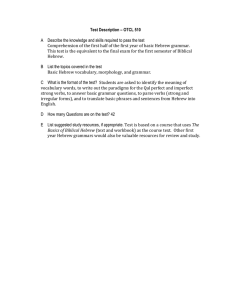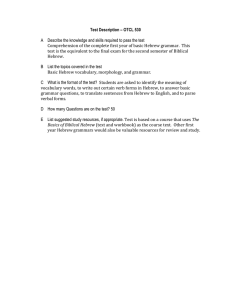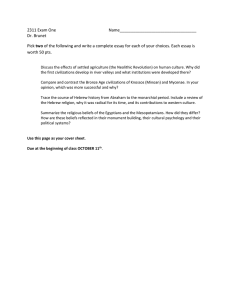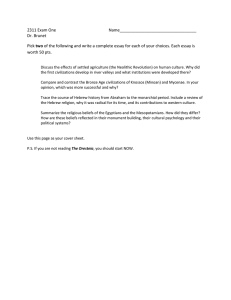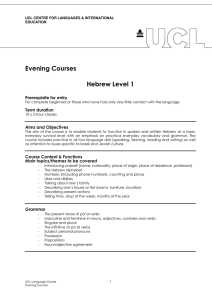ON 605 Thursday 8:30-11:00 Hebrew Readings
advertisement
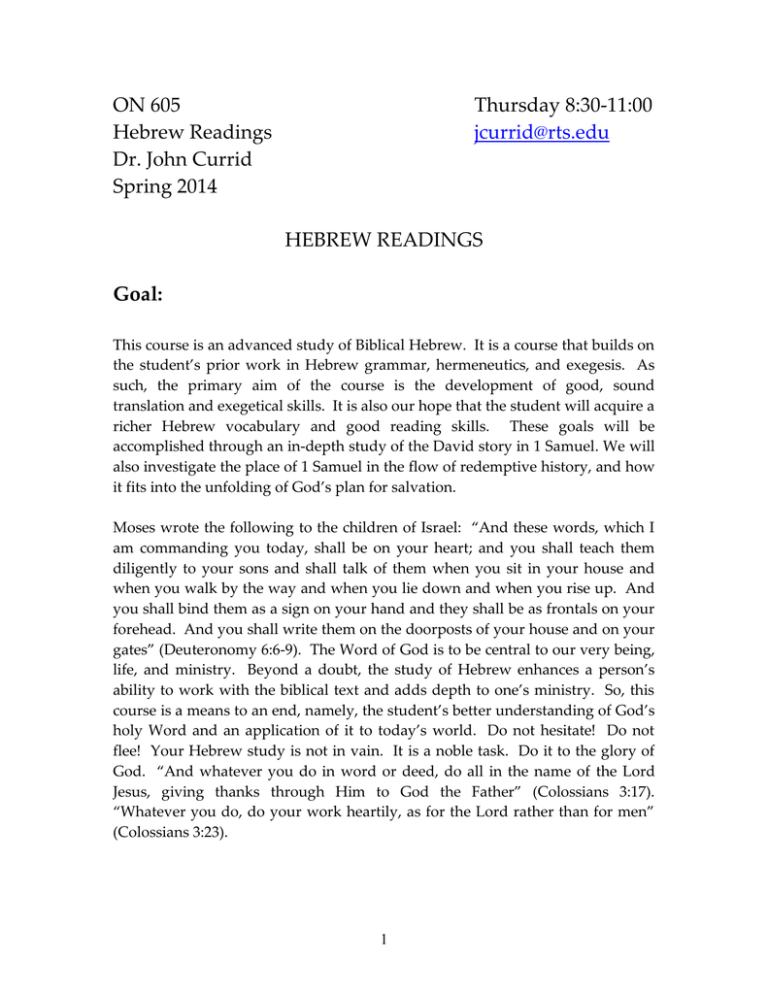
ON 605 Hebrew Readings Dr. John Currid Spring 2014 Thursday 8:30-11:00 jcurrid@rts.edu HEBREW READINGS Goal: This course is an advanced study of Biblical Hebrew. It is a course that builds on the student’s prior work in Hebrew grammar, hermeneutics, and exegesis. As such, the primary aim of the course is the development of good, sound translation and exegetical skills. It is also our hope that the student will acquire a richer Hebrew vocabulary and good reading skills. These goals will be accomplished through an in-depth study of the David story in 1 Samuel. We will also investigate the place of 1 Samuel in the flow of redemptive history, and how it fits into the unfolding of God’s plan for salvation. Moses wrote the following to the children of Israel: “And these words, which I am commanding you today, shall be on your heart; and you shall teach them diligently to your sons and shall talk of them when you sit in your house and when you walk by the way and when you lie down and when you rise up. And you shall bind them as a sign on your hand and they shall be as frontals on your forehead. And you shall write them on the doorposts of your house and on your gates” (Deuteronomy 6:6-9). The Word of God is to be central to our very being, life, and ministry. Beyond a doubt, the study of Hebrew enhances a person’s ability to work with the biblical text and adds depth to one’s ministry. So, this course is a means to an end, namely, the student’s better understanding of God’s holy Word and an application of it to today’s world. Do not hesitate! Do not flee! Your Hebrew study is not in vain. It is a noble task. Do it to the glory of God. “And whatever you do in word or deed, do all in the name of the Lord Jesus, giving thanks through Him to God the Father” (Colossians 3:17). “Whatever you do, do your work heartily, as for the Lord rather than for men” (Colossians 3:23). 1 Required Textbooks: 1. A Hebrew Bible (preferably Biblia Hebraica Stuttgartensia). 2. A Hebrew lexicon (either BDB, Holladay, or Koehler and Baumgartner). 3. R. Omanson and J. Ellington, A Handbook on The First and Second Books of Samuel (New York: UBS, 2001). On reserve (read pp. 333-396). Class Requirements: 1. Students are required to attend class. 2. Students must be prepared for class, and they must be able to read, translate, exegete, and discuss the assigned material. Grading: There are no papers, quizzes, or exams. Grades are entirely determined by a student’s preparation and class participation. The student must demonstrate that he has adequately prepared the Hebrew text and can competently interact with it in a classroom setting. During each class period, students will be assigned a set of verses that will be discussed in the following class. Preparation includes: (1) a hand-written translation from Hebrew to English; and, (2) parsing of all Hebrew verbs. Class Schedule: 1. April 3 Syllabus 1 Samuel 16:1-13 2. April 10 1 Samuel 16:14-23 3. April 17 1 Samuel 17:1-18 4. April 24 1 Samuel 17:19-37 5. May 1 1 Samuel 17:38-58 6. May 8 1 Samuel 18:1-16 2 3

